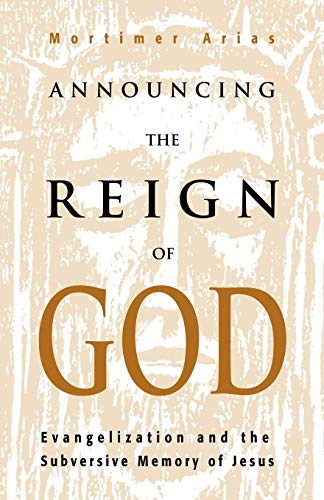Announcing the Reign of God: Evangelization and the Subversive Memory of Jesus
Written by Mortimer Arias Reviewed By Harvie M. ConnIt is sad but true that, until recently, those interested in the theme of the kingdom of God generally have not been interested in the evangelistic task of the church. And it is equally true that those interested in evangelization have not been taken with the theme of the kingdom. Books on evangelism are generally how-to-do-it manuals, reducing their object to a method rather than a message. Books on the kingdom are why-to-do-it academic exercises, reducing their object to a message and not also a mission.
This volume by the current Professor of Hispanic Studies and Evangelization at the School of Theology, Claremont, California joins that small but growing collection of works that seek to combine the best of both worlds and eliminate the worst. It is an exciting effort to develop an holistic concept of evangelism using the kingdom of God theme as its frame of reference.
The bulk of the book leans heavily to the theological side of the debate. The first five chapters of the work are a rich balance of scholarship, drawing from such disparate sources as George Ladd and Jürgen Moltmann, Herman Ridderbos and Jon Sobrino, yet pulling them together in a fine use of the biblical theological method. The focus never loses its vision of Christ as the presence of the kingdom and its future. Evangelism regains its eschatological dimension as the confrontation of the old age through the in-breaking of the new in Christ. Such traditional topics as the forgiveness of sins, repentance and conversion are not slighted. They are rather illuminated as part of the call of the imminent reign of God in Christ.
In the last three chapters Arias draws closer to the evangelism side of the debate, in his exposition of the announcement of the kingdom as gift (ch. 6), as hope (ch. 7) and as challenge (ch. 8).
Little of what I have said conveys the stimulation of the book. And not a small part of that is provided by the examples Arias draws from his background as a bishop of the Methodist Church in Latin America and the cost of kingdom discipleship he has seen in others and experienced himself in prison. Motivational is too psychological a term to describe the style, confrontational too frightening. He succeeds in making the kingdom what it is at heart—challenge.
I hope it will not be seen as detracting from the overall value of the book if I offer a few frustrations. I would have liked to have seen more linking of kingdom evangelism with those traditional concerns of the evangelical for the need for a personal relationship with Christ. Arias’ concern to underline the holistic side of evangelism draws him toward such issues as social justice and human rights violations. As evangelicals we need to hear this. But we need to hear it in close collaboration with those personal dimensions often minimized in current discussions of ‘holistic evangelism’. I am convinced Arias is deeply committed to that dimension. But it needs to be stated a bit louder to be more reassuring to the community that needs to hear Arias.
I would have liked to have seen his biblical exposition expanded in two areas. One of those directions is toward the OT background of the reign of God that furnishes the backdrop and promise of Jesus’ fulfilling ministry. Especially here the holistic element so important to Arias could have been given more exegetical support. The concentration of the book is deeply toward the synoptic gospels.
A lesser lack is his attention to the rest of the NT and the minimization of ‘kingdom’ language. Arias, I think unwisely, calls his chapter on this material ‘the eclipse of the kingdom’ (ch. 5). Though he pays full attention to the shift from Jesus as Proclaimer to Jesus as Proclaimed, he did not leave me satisfied fully with his exposition of the difference. And it is this change in language which leaves me sceptical about the wisdom of using one biblical image (the reign of God) as an overall rubric for the entire NT. It is most certainly the direction being taken by missiologists like Johannes Verkuyl. But whether it fully captures all the nuances of the history of special revelation is questionable to me at this point. It seems, unless carefully explained, a step back from the use of biblical theology as a disciplined approach to the study of evangelism to the theological temptation of ontologizing. Arias is pressing in this new direction. Does he press carefully enough?
Let none of this detract from Arias’ effort to help us rediscover the theme of the reign of God as ‘the subversive memory of Jesus’. His work goes a long way in ‘calling us to the fullness of the biblical gospel of the kingdom to be announced to our generation’ (p. 67).
Harvie M. Conn
Westminster Theological Seminary, Philadelphia






